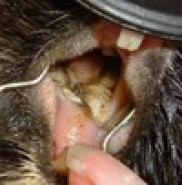
Teeth
Guinea pigs need regular dental check-ups every year from the age of 1 year and upwards. If you have never had your teeth checked by a vet and they are over 1 year old, then now is the time to do it. Guinea pigs have teeth grow constantly and just never stop growing. Proper dental care is essential and, if their teeth aren’t cared for properly, then they could develop a variety of serious complaints. Even if we provide them with lots of hay and other fibre, and tons of safe natural wood toys to chew and tug, our little friends can still develop problems. Sometimes it’s just genetic.
Guinea pigs have 20 teeth total: 4 incisors (2 uppers and 2 lower), no canines, 4 premolars (2 upper and 2 lower), and 12 molars (6 uppers and 6 lower).
The sharp incisors at the front of the mouth are used for cutting food whilst the premolars and molars do all the grinding and chewing. The incisors of a healthy guinea pig can grow at a rate of 5 to 7.cm each year and if they are not given the correct diet to help wear down these teeth, they will become too long and your Guinea Pig will not be able to eat.
Signs that there may be a problem with your Guinea Pigs teeth include.
- Your Guinea pig may have some trouble eating, picking at the food and acting like something is stuck in his or her mouth.
- Weight loss. Is your piggy losing weight? Does he/she feel bony?
- The mouth may hang open just a bit since it can’t close properly anymore.
- Your guinea pig’s chin and lower jaw may be damp or even kinda drippy. This is called The Slobbers and usually happens when the malocclusion is advanced.
- If you have other guinea pigs, do the others eat faster?
- Can your piggy eat all the foods and parts of foods? For instance, does he eat the apple peel as well as the softer inside part? Or does he go for the soft food?
- Does he act all excited about eating, then not eat, or pick up something in his mouth and drop it again uneaten?
- Are they sitting hunched up like they are in pain?
“Malocclusion” just means the teeth don’t line up right and interfere with the mouth working properly.
If your Guinea Pig has any of these tell-tale signs that I have mentioned, please see your Vet as soon as you can. The vet may need to perform an operation to file their teeth down so that they can eat again. Yes the risks of an anaesthetic are high especially in an old Guinea Pig, but starving to death when the food is right in front of you is a lot worse!!
Other problems that can happen with a guinea pigs teeth are:
Teeth can also shift in position and become misaligned due to scurvy, a disorder resulting from insufficient vitamin C in the diet.
Sometimes your guinea pig may Break a tooth. This can be caused by chewing too hard on their cage or a fight or chewing incorrect toys not suitable for them. If you find they are broken or damaged in any way, your guinea will need to have their teeth trimmed or filed so that they are even again. Any sharp or serrated edges will puncture and damage the inside of your guinea pigs mouth, making it sore and then they won't eat due to the pain.
Just like rabbits, guinea pig’s teeth are open rooted and continuously growing. Sometimes, the roots of your guinea pig’s teeth can get pushed up or start growing into the jaw. This results in elongated, sometimes bumps can be felt along the lower jawline. If you notice your guinea pig’s eyes tearing or bulging, this can be an indication that the roots of the top teeth are growing incorrectly.
Things you can do to help keep their teeth in a good condition.
In the wild, guinea pigs keep their teeth in shape by eating woody plants and hard grasses and chewing branches and wood.. Commercial guinea pig pellets might provide adequate nutrition, but they aren't doing much for their teeth.
- Giving them hay 24/7 is a must, not only for their teeth but for their digestion too.
- Giving your Guinea pig lots of wooden toys to chew on will help. If your piggie is chewing your hutch, it is because he hasn’t got enough in there to chew on.
- Cardboard tubes are great too.
- Stuff old toilet roll tubes with hay.
- Untreated wood sticks or blocks are fine for your guinea pig, with the exception of pine and cedar which have strong odours, making for discomfort and possible lung damage.
- Give them a mixture of hay. Some hay is coarser than others.
- Apple sticks are very good, taste nice too!
Every hutch or cage should contain all of the above every single day.

